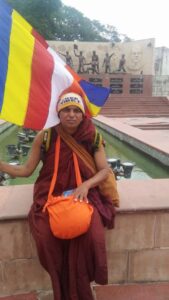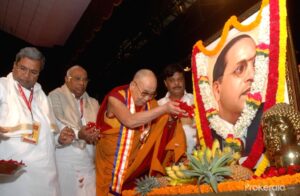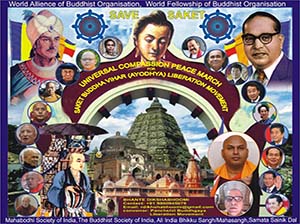
Bhante Dikshabhoomi
Bhante Dikshabhoomi is a Theravada monk from Nagpur in Maharashtra. Since 2018 he has travelled throughout India spreading the messages of Free Tibet and Universal Compassion. Recently he came to Dharamshala and spoke to Contact magazine.
Bhante was born into a Buddhist family in the Mahar caste. He became a monk in 2016 and is now part of Samata Sainik Dal, a social organisation which seeks to safeguard the rights of all oppressed sections in Indian society. Bhante follows the teachings of the Buddha and Dr Bhimrao Ramji Ambedkar, the founder of the Navayana (New Vehicle) movement within Buddhism, who he considers to be a bodhisattva. Ambedkar famously pressured Mahatma Gandhi throughout his life about the necessity of eradicating the caste system in an independent India.
“The Buddhist Sangha was the first organisations to eradicate caste in India,” Bhante says. “Buddha embraced all of mankind, all of the sentient beings. But the caste system is useful for the powerful people, they can use it to divide and rule.”
On November 20, 1956, Dr Ambedkar delivered a famous speech entitled Buddha or Karl Marx at the Fourth Conference of the World Fellowship of Buddhists in Kathmandu, Nepal. Amdedkar criticised Karl Marx and Communism, saying that the philosophy’s focus on materialism neglected the spiritual dimension of human beings and suggested that they were “no better than pigs.” In a powerful passage Ambedkar contrasted the styles of the Buddha and Marxism: “The Buddha’s way was not to force people to do what they did not like to do although it was good for them. His way was to alter the disposition of men so that they would do voluntarily what they would not otherwise do.”
“Everybody should read Buddha or Karl Marx”, Bhante advises. “The Chinese have destroyed Tibet in the name of Marxism, but the world cannot be remade through violence, it must be remade by education, by serenity, by discipline, by brotherhood, this is the message of the Buddha and Bodhisattva Ambedkar.”

His Holiness the Dalai Lama during a seminar on Social Justice and Dr BR Ambedkar at Ambedkar Bhavan, of Bengaluru on May 23, 2017.
His Holiness the Dalai Lama is an admirer of Ambedkar’s teachings. In 2017 he referred to him as “that great man of the 20th century” and praised him for bringing about a revival of Buddhism in India.
“His Holiness the Dalai Lama and Bodhisattva Ambedkar met in Delhi on December 3, 1956,” Bhante says, “His Holiness was only 18 years old at that time. Three days late Bodhisattva Ambedkar passed away. One bodhisattva was leaving, but another, the Dalai Lama, had come.”
Bhante was inspired to speak about the Tibetan issue after reading an article on the subject by his master, Chimanker, which was published in Hindi in 1992. He has since spoken about the cause of Tibet throughout India, travelling over 2,000 kilometres. However, he finds knowledge about Tibet among the common people to be lacking: “The villagers don’t know the world. They only know their stomach, their children and their animals.”
Bhante praises the Tibetan people for their non-violent approach in response to Chinese aggression. “The Tibetans are a truly noble people,” he says, “but their culture has been destroyed by the Chinese. Yet, still the Tibetan people do not want to take up the sword against the Chinese, because they are a peaceful, non-violent people. This mindset is necessary for the whole world. We seem to be heading towards a Third World War, but with discipline and patience it can be avoided. The Dalai Lama and the Tibetans have shown us the way.”
Before returning to Nagpur, Bhante had two pieces of advice: “Buddhist monks should be discussing philosophy and sharing ideas. Focus on the teachings! In chanting there is no meaning – it is just like watching a movie or listening to a song. Many people are putting the Buddha’s teachings to the side and just chanting.”
He added, “Everybody should read Ambedkar’s bible, The Buddha and His Dhamma.”





 Print
Print Email
Email













